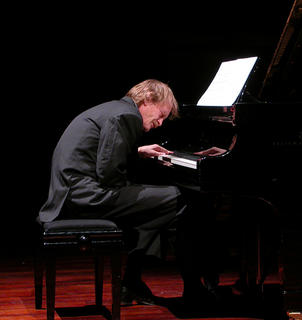 Known largely to pianists and piano music aficionados in this country, Håkon Austbø is a musician who has received a slew of prizes and awards for his performances and recordings. With Pierre-Laurent Aimard, he is among the foremost Messiaen interpreters of our day. (Incidentally, he studied with Messiaen and was a piano student of Messiaen’s wife, Yvonne Loriod.) As the sparing but informative program notes revealed to me, he is also one of the founding members of the LUCE Foundation, which – among other things – aims to “provide a platform for further preparations and management of Scriabin’s Prometheus.” (More about that in Charles’s article on the discussion with Håkon Austbø that followed the concert and his review for DCist.) The concert was the concluding event of the Hirshhorn Museum of Modern Art’s Visual Music exhibition and with works by Scriabin and Messiaen included two composers who creatively tapped into (or suffered from) their pronounced synesthetic disposition.
Known largely to pianists and piano music aficionados in this country, Håkon Austbø is a musician who has received a slew of prizes and awards for his performances and recordings. With Pierre-Laurent Aimard, he is among the foremost Messiaen interpreters of our day. (Incidentally, he studied with Messiaen and was a piano student of Messiaen’s wife, Yvonne Loriod.) As the sparing but informative program notes revealed to me, he is also one of the founding members of the LUCE Foundation, which – among other things – aims to “provide a platform for further preparations and management of Scriabin’s Prometheus.” (More about that in Charles’s article on the discussion with Håkon Austbø that followed the concert and his review for DCist.) The concert was the concluding event of the Hirshhorn Museum of Modern Art’s Visual Music exhibition and with works by Scriabin and Messiaen included two composers who creatively tapped into (or suffered from) their pronounced synesthetic disposition.  O.Messiaen, Petites esquisses d'oiseaux / Catalogue d'oiseaux, H.Austbø Naxos       A.Scriabin, Complete Piano Sonatas, H.Austbø Brilliant     |
If you understand Scriabin’s musical language (and I mean ‘understand’ in the loose sense of being able to derive pleasure from listening to it), then you are only one step away from ‘understanding’ Messiaen. I’ve listened to Messiaen for much longer than Scriabin, but my reaction had long been a sort of peripheral enjoyment at best. (That excludes his accessible and darkly delightful Quatuor pour la fin du temps.) Not having heard Messiaen piano works live before, I could have not asked for someone much better than Håkon Austbø as my first.
Like a good deal of modern classical music, Messiaen benefits invaluably from the live experience. (If perhaps not so much as to have won over the still impeccably behaving girl in the first row who gave a curious and doubt-ridden look towards Austbø before snuggling against her father’s arm.) The works that Håkon Austbø continued to shake out of his hands with seeming ease and complete sovereignty were Regard du Silence and Noël from Vingt Regards sue l'Enfant-Jésus and La Bouscarle from the Catalogue d’oiseaux. If I say that it sounded a bit like watching Pollock paint one of his canvases might, you will be able to decide for yourself whether you would have loved or loathed it. Intriguing it should have been to anyone present.
Håkon Austbø’s appearance was kindly supported by the Royal Norwegian Embassy as one of the first events of their Centennial Anniversary celebrations that will include many appearances of Norway’s finest artists all over Washington.
No comments:
Post a Comment